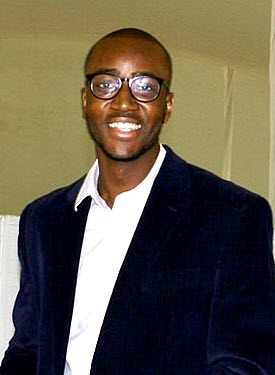

 |
||
|
Galadu Subah says he will never forget the moment he learned he’d been accepted into NYMC’s Graduate School of Basic Medical Sciences (GSBMS) traditional program—the moment that put him on the path to work in the lab of Patric K. Stanton, Ph.D., professor of cell biology and anatomy and neurology, and ultimately inspired his dream to become a physician-researcher. “It began with a phone call from Dr. Kenneth Lerea, [Ph.D., associate professor of cell biology and anatomy.] I received his call while I was sitting in traffic on I-695 in Baltimore. Needless to say that phone call was life changing,” he says.
Upon completing his M.S. in 2016, Mr. Subah was accepted in the NYMC School of Medicine Class of 2019; then after embarking on his medical studies, he was accepted into the M.D./Ph.D. dual degree program. “What this means for me is that, after I take my Step 1 exam this summer, I will be going into the lab to work toward my Ph.D. rather than going into my third-year clerkships. The Ph.D. portion generally takes two to three years to complete, after which I will join that group of third-year medical students and finish out the program,” he explains.
Here, Mr. Subah shares his thoughts on what makes the GSBMS so special, provides a glimpse into his most memorable moments, and dishes out wisdom for the next class of students:
What has been the best part of your experience at NYMC?
The best part of my experience has been my encounters with the educators— from the aforementioned Dr. Lerea and the GSBMS faculty with whom I got to interact closely during my years as a graduate student, to the current professors and clinicians I get to learn from as a medical student. They are always available for a question or for a friendly chat in the halls. All have been exceptionally knowledgeable, accessible and, perhaps above all else, truly invested in helping out every student.
In addition, I feel like I gained a better understanding of some of the topics because of the pace, depth, and style in which the graduate courses were taught. I am currently studying for my STEP 1 exam and I constantly find myself drawing upon lectures from my time as a graduate student. My advice for students considering the linkage program would be to stop considering and to sign up.
Tell us about an unforgettable moment or favorite experience?
My first day of class as a medical student was a significant moment, one that I’m proud of because it meant I was able to capitalize on my work in the graduate program (where I had spent my time dotting every i and crossing every t) to get to this point.
You’ve been accepted into the M.D./Ph.D. program—what inspired you to take-on this rigorous program?
During my time as a graduate student, I was able to join Dr. Stanton’s lab. Our lab focuses on understanding the processes that underlie synaptic connections within the brain and my particular focus has been on understanding the phenomenon known as spreading depolarization, a wave of energy that has been implicated in many neural pathologies including migraines, traumatic brain injuries and stroke. During that time, I became enamored by basic science research. Beyond my time here at NYMC, I aim to use both of these sets of skills as a practicing physician-scientist. I hope to be able to apply the fundamental findings of basic science research into my patient care.
If you could go back and give yourself advice on your very first day of class, what would it be?
One of my favorite quotes is, “Don’t confuse regret with wisdom”— it is easy to look back and say it would have been great to have known a thing or two from the start, however those (sometimes trivial) lessons are all part of the journey. So, if I could go back in time and give myself advice, it would be to simply pay attention; to relish the totality of the experience that is to come. It’s about the journey as much as is it the final goal of a career in medicine.